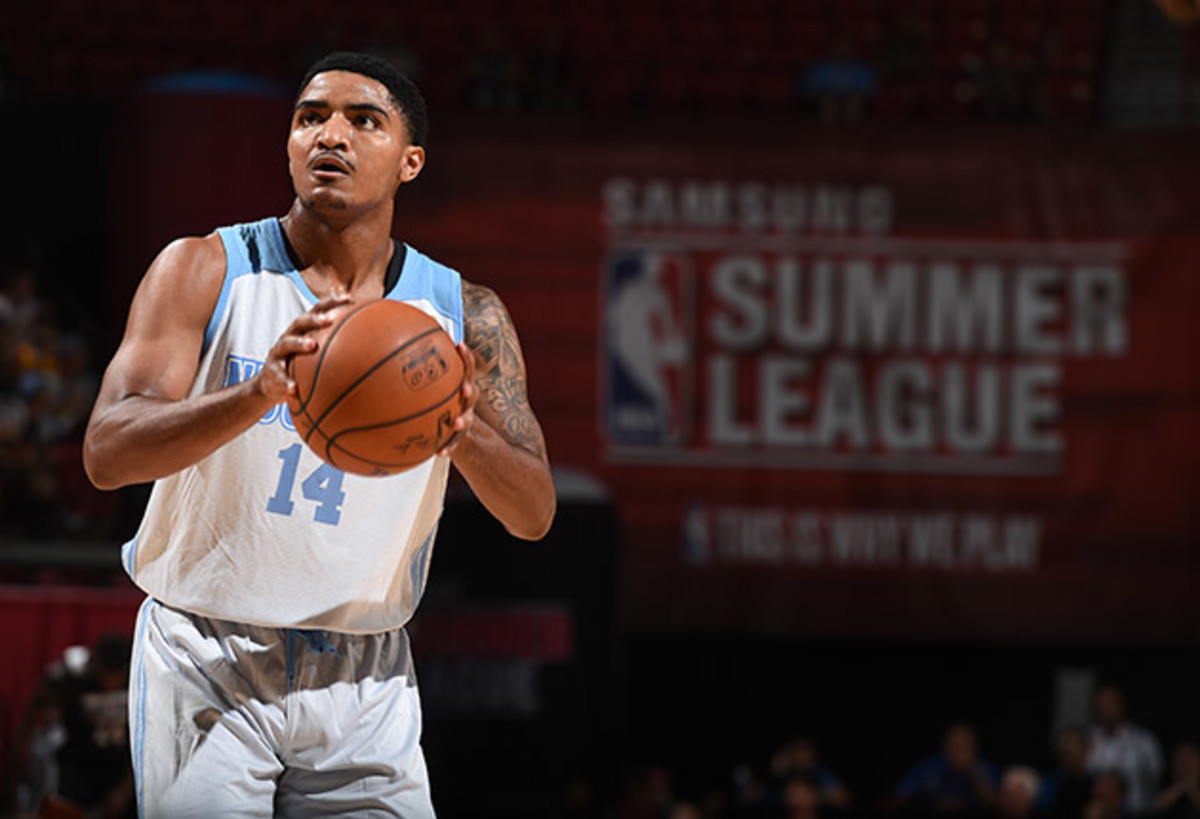Nuggets guard Gary Harris hopes to inspire dread

Your teams on the go or at home. Personalize SI with our new App. Install on iOS or Android.
Gary Harris seeks attention every time he steps on the floor. Rarely does the ball wind up in his hands as a deliberate function of the offense; Harris tends to do much of his work without the kind of direct control that most players crave, if only because his game lends itself to reactivity. In lieu of direct usage, Nuggets head coach Mike Malone has encouraged Harris to keep active in a way that makes him available to his teammates and concerning to opponents.
"Coach," Harris notes, "tells us to make the ball see you."
NBA players are subject to constant evaluation from every angle. Their basic contributions are tabulated in box scores and then refined into a battery of next-level stats. Their performances are documented and critiqued publicly and privately through a wide range of criteria. For players like Harris, though, no evaluative metric is more telling than attention. The entire game revolves around the push and pull of who is demanding it and when. Harris, in his second season with Denver, found ways to make his claims for attention even clearer—to register as the kind of player that deserves a defense's notice.
"You just want to do that as much as possible when you're cutting," Harris said. "You're able to get a back cut or able to suck a defender to help. You cause the defense to react and get them to do something."
• Durant's value on display vs. China | NBA chooses sanity, moves ASG

As simple as that may sound, forcing an opponent to do something is the fertile ground in which all efficient offense is rooted. Professional ball players can, by and large, execute defensive systems with ease if they're allowed to enact their principles as rote memorization. The basics are programmed. It's up to players like Harris to scramble them—slicing through the lane or down the baseline at a time that forces a defense to make a tricky decision. A little tension between a defender's priorities according to the system and a defender's priorities according to his circumstances can go a long way.
This is where Harris lives. His pick-and-roll game is nascent—functional in some cases but not yet fully natural or reliable. There will be more opportunity this season for Harris to test out that element of his game, but only because he's subsidized his development with the strength of his work off the ball. Harris made the ball see him, to borrow Malone's phrasing, and found a lane to playing time and a starting spot. A no-frills cutter who shoots respectably (35.4% from three last season, up from 20.4% the season prior), rebounds competitively, and defends committedly is a difficult one to keep off the floor.
Open Floor Podcast: Goodbye Summer League, hello Team USA
With some developmental scaling, Harris could become an instrumental sort of contributor. Getting to that point wouldn't require him to be anything other than what he's been—if even more aware on offense at times and attuned to the second-to-second requirements of NBA-level defense. There's no need to focus Harris and his game to too fine a point. Growth can come from a balanced diet.
As it stands today, Harris is more versatile than flexible—best suited for a particular kind of role, though able to navigate within that role in a way that gives Denver options over the course of a given possession. It's worth noting, too, that the way Harris operates is especially helpful to a franchise investing its developmental capital between a handful of young prospects. Players like Nikola Jokic, for example, will grow with more touches and creative opportunity. There's only so much of that kind of possession usage to go around after also accounting for Emmanuel Mudiay, Jusuf Nurkic, rookies Jamal Murray and Malik Beasley, and Denver's veterans.
• Fredette still knocking on NBA door | Booker being shaped for stardom
Part of what makes Harris such a nice developmental component is that his own progress won't get in the way. What Harris brings augments what a player like Jokic does, a fact which facilitated their easy on-court relationship last season. "We got a little chemistry going," Harris said of working with Jokic. "I can kinda see what he's thinking just by his eyes, and he sees what I'm thinking." This is the meet cute of a promising high-post passer and an off-ball natural.
That kind of synergy makes it all the easier for Harris to draw the kind of attention he needs to be effective. Earning notice is the first, critical step to becoming part of a winning basketball dynamic. The next, as Harris sees it, is to work and defend in a way that inspires dread.
"I want people to think: Oh damn, I don't want to guard him and I don't want him to guard me," Harris said. "It's gonna be a long night. He's gonna be annoying. I want to be one of those defenders where they feel my presence every time on the court."
